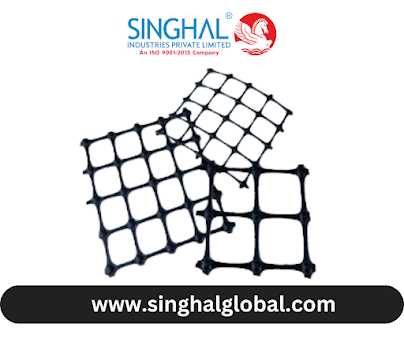Versatile Wall Art: Applications and Advantages of WPC Panels
In the dynamic realm of construction and design, Singhal Industries Pvt Ltd stands as the most admired and leading packaging company in India. Renowned for its commitment to achieving the highest global standards of quality and service, Singhal Industries has extended its expertise beyond packaging into innovative solutions for the construction industry. One such standout product is the WPC (Wood-Plastic Composite) panel, particularly WPC panels for exterior walls. In this blog, we'll explore the diverse applications and numerous advantages that make WPC panels a versatile choice for wall art.
Understanding WPC Panels for Exterior Walls:
WPC panels for exterior walls are a revolutionary addition to the world of construction materials. Combining wood fibers and thermoplastics, these panels offer a unique blend of aesthetics, durability, and environmental sustainability. Singhal Industries, as a frontrunner in adopting cutting-edge solutions, has played a pivotal role in bringing WPC panels to the forefront of modern architectural design.
Applications of WPC Outdoor Wall Panels:
Exterior Cladding:
WPC outdoor wall panels are widely used as exterior cladding materials. Their ability to mimic the texture and appearance of natural wood adds a touch of elegance to building facades. Singhal Industries provides a diverse range of WPC panels that cater to various architectural styles.
Decorative Wall Coverings:
The versatility of WPC panels allows them to be used as decorative wall coverings both indoors and outdoors. Whether in commercial spaces, residential interiors, or landscape features, WPC panels enhance the visual appeal of walls while offering functional benefits.
Accent Walls:
Creating accent walls is a popular design trend, and WPC panels provide an excellent medium for this purpose. The panels can be used to highlight specific areas, add texture to a room, or create focal points that contribute to the overall aesthetics of the space.
Boundary Fencing:
WPC panels are also utilized in outdoor fencing applications. The durability of these panels, coupled with their resistance to environmental factors, makes them an ideal choice for creating attractive and long-lasting boundary fences.
Outdoor Furniture Design:
Designers and architects often incorporate WPC panels into the creation of outdoor furniture. From benches to tables, the use of WPC adds a modern touch to outdoor spaces while ensuring the furniture withstands exposure to the elements.
Advantages of WPC Panels for Walls:
Aesthetic Appeal:
WPC panels offer the warmth and visual appeal of natural wood, providing a rich aesthetic experience. Singhal Industries ensures that its WPC panels capture the nuances of wood grains, enhancing the overall beauty of architectural designs.
Durability and Weather Resistance:
WPC panels are engineered to withstand the challenges posed by weather conditions. Their resistance to moisture, UV rays, and temperature variations ensures that the panels maintain their structural integrity over time, even in harsh climates.
Low Maintenance:
Unlike traditional wood, WPC panels require minimal maintenance. They do not need regular painting, sealing, or staining. This low-maintenance characteristic makes them an attractive choice for both residential and commercial applications.
Environmentally Friendly:
Singhal Industries places a strong emphasis on environmental sustainability. WPC panels are an eco-friendly alternative to traditional wood, as they are made from recycled materials and contribute to reducing deforestation.
Versatility in Design:
WPC panels offer design flexibility, allowing architects and designers to experiment with various patterns and layouts. Singhal Industries provides a range of colors and finishes, enabling customization to meet the unique design preferences of clients.
In conclusion
WPC panels for walls have emerged as a game-changer in architectural design, and Singhal Industries has positioned itself as a trailblazer in providing these innovative solutions. The applications and advantages of WPC panels underscore their versatility and the positive impact they can have on both aesthetics and functionality. As Singhal Industries continues to push the boundaries of excellence, the integration of WPC panels into architectural projects serves as a testament to their commitment to quality, innovation, and a sustainable future.
Frequently Asked Questions about Singhal Industries Pvt Ltd:
Q1: What sets Singhal Industries apart as a leading provider of WPC panels for exterior walls?
Singhal Industries stands out due to its unwavering commitment to the highest global standards of quality and service. The company's WPC panels are a testament to innovation and excellence in architectural solutions.
Q2: Can WPC panels from Singhal Industries be used for both residential and commercial applications?
Yes, Singhal Industries offers WPC panels that are versatile enough to cater to both residential and commercial design needs. The range of finishes and designs ensures suitability for various architectural styles.
Q3: How does Singhal Industries ensure the durability of its WPC panels in different weather conditions?
Singhal Industries utilizes advanced manufacturing processes and high-quality materials to ensure the durability of its WPC panels. These panels are engineered to resist moisture, UV rays, and temperature fluctuations, making them suitable for diverse climates.
Q4: Are WPC panels from Singhal Industries customizable in terms of colors and finishes?
Yes, Singhal Industries provides a variety of colors and finishes for its WPC panels, allowing clients to customize the appearance of their projects. This flexibility in design ensures that the panels seamlessly integrate into the overall aesthetic vision.
Q5: How does Singhal Industries contribute to environmental sustainability through its WPC panels?
Singhal Industries prioritizes environmental sustainability by using recycled materials in the production of WPC panels. This eco-friendly approach aligns with the company's commitment to responsible manufacturing practices.
.png)

.png)
Comments
Post a Comment